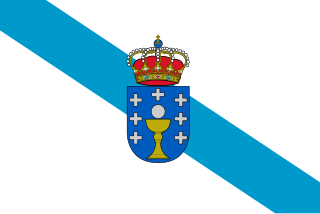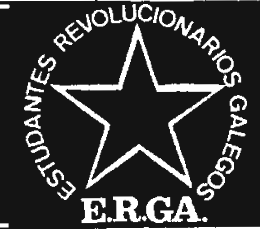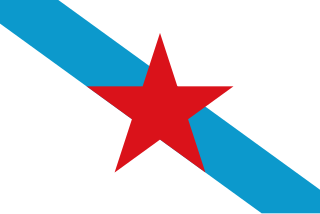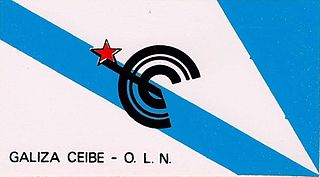
The Galician Nationalist Bloc is a political alliance of left-wing Galician nationalist parties. It is self-defined as a "patriotic front".

Dia Nacional de Galicia is when the autonomous community of Galicia in Spain celebrates its national holiday. It falls on 25 July.

Galician Revolutionary Students was a leftwing nationalist students organization in Galicia, Spain. ERGA functioned as the students wing of the Galician People's Union (UPG). ERGA was founded in 1972. ERGA published a monthly, Lume. ERGA was the first mass organization of nationalism after the civil war, got a broad presence in the universities and high schools of Galiza and formed future UPG leaders and militants.
The Galician People's Union is a Galician nationalist and communist political party, and is one of the registered political parties of Spain. The party publishes the magazine Terra e Tempo, and the secretary general is Néstor Rego.

Galicianism is a regionalist political movement in Galicia.

Galician nationalism is a form of nationalism found mostly in Galicia, which asserts that Galicians are a nation and that promotes the cultural unity of Galicians. The political movement referred to as modern Galician nationalism was born at the beginning of the twentieth century from the idea of Galicianism.

Xosé Manuel Hixinio Beiras Torrado is a Galician politician, economist, writer and intellectual. He is professor of Structural Economy at the Faculty of Economic Sciences of the University of Santiago de Compostela. He is a former member of the National Council of the Galician Nationalist Bloc, he is currently the leader of Renewal–Nationalist Brotherhood, an independentist political party. He formerly had representation in the Galician parliament.
Loita Armada Revolucionaria was an armed Galician nationalist and left-wing independentist organisation. Linked to the political party Galician Party of the Proletariat and the organization Galiza Ceibe-OLN, the group was formed in 1978 and carried out several attacks around Galicia, such as bank assaults and bombing campaigns.

Renewal–Nationalist Brotherhood is a political party in Galicia. Formed in 2012, under the guidance of historical leader Xosé Manuel Beiras, Anova was formed by Encontro Irmandiño, the FPG, Movemento pola Base, the Galician Workers Front and independent militants. Anova defines itself as a Galician nationalist, socialist, feminist, Galician independentist, ecologist, internationalist organization. Its internal organization is run by assemblies.

Galiza Ceibe-OLN was an independentist and socialist political party in Galicia, Spain. Galiza Ceibe was founded on 1980 by the Galician Party of the Proletariat as a political and electoral front, originally to present a list in Vigo and in other galician municipalities under the name Agrupación Electoral Galicia Ceibe in the 1979 local elections.
The Assembly of the United People (APU) was a Galician political organization, with an independentist, socialist and feminist ideology. It was formed in 1989 from a split of the first Galician People's Front, and disappeared with its self-dissolution in 1995.

Isca! is the name of a Galician youth organization that promotes Galician independence, combined with anti-capitalist and feminist ideology. They are linked to the Galician Movement for Socialism, a socialist and pro-independence party that forms part of the Galician Nationalist Bloc (BNG).

The Galician Movement for Socialism is a Galician communist, pro-independence and feminist organization. The MGS was born in March 2009, although its origins go back to the summer of 2006. The MGS works inside the Galician Nationalist Bloc and the Confederación Intersindical Galega.

The Galician Socialist Party was a socialist and Galician nationalist political party active in Galicia.

Commitment to Galicia is a Galician political party with a Galician nationalist, progressive ideology.

Encontro Irmandiño is a political organization that is part of Anova-Nationalist Brotherhood in Galicia, Spain. It used to be an internal current in the Galician Nationalist Bloc (BNG). EI was founded in 2007 and has an ideology based in Galician nationalism, direct democracy, anticapitalism, feminism and alter-globalization.
Communist Movement of Galicia was a communist political party created in Galicia during the last years of the dictatorship of Franco as the Galician section of the Communist Movement, although in practice the MCG acted as an independent party. The leaders of the MCG were Xesús Veiga Buxán and Carmen Santos Castroviejo. Unlike other sections of Spanish left-wing political parties, the MCG was close to the Galician nationalist movement and supported self-determination and national sovereignty for Galicia.
Galicia Socialista was a clandestine anti-francoist group that operated in Galicia, mainly in the city of Vigo.

Lidia Senra Rodríguez is an agrarian and political unionist from Galicia. She was secretary general of the Sindicato Labrego Galego (SLG) for 18 years and, since 2014, has been a Member of the European Parliament.

Galicia irredenta or Galicia estremeira, also spelled as Galiza irredenta and Galiza estremeira and also known as Faixa Leste or Franxa Leste, is a term used for all Galician-speaking territories located outside of Galicia. These are all located in Spain, in either Asturias or Castile and León. These territories are sometimes divided into three subregions: El Bierzo, Eo-Navia and As Portelas.














